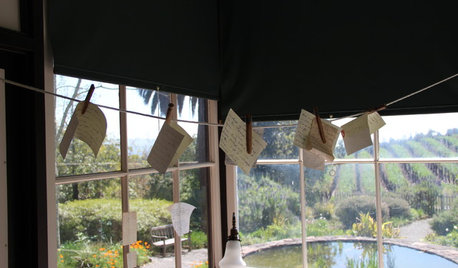writing a book...now what??
tammieL
20 years ago
Related Stories

RANCH HOMESSee the Estate That Drove Jack London to Write
In honor of the ‘Call of the Wild’ author’s birthday January 12, we tour the reason he wrote all those books
Full Story
DECORATING GUIDESDiscover the Draw of Writing on the Walls
Let your freehand break free with write-on wallpaper, dry-erase paint and other design inventions that celebrate the scribble
Full Story
FURNITUREA Love Letter to Writing Desks
Handwritten notes often become etched in our memories, but these writing desks are memorable in their own right
Full Story
DECORATING GUIDES12 Antique Store Finds to Nab Now, Place Later
See the accessories one decorator always buys when she spots them — as long as she gets there first
Full Story
BACKYARD STUDIOS12 Garden Sheds and Cottages We Love Now
Get inspiration from these inviting backyard spaces that house offices, guest quarters, garden storage and more
Full Story
HOUSEKEEPINGAll Together Now: Tackle Home Projects With a DIY Co-op
You're in good company when you pair up with a pal to clean, organize, repair and replace
Full Story
BUDGET DECORATINGBudget Decorator: 15 Fun Thrifted Finds to Score Now
Show holiday guests your ingenuity and design flair with these easy-to-find vintage and repurposed pieces for the home
Full Story
STUDIOS AND WORKSHOPSCreative Spaces: Once a Garage, Now an Art Studio and Office
See how an artist and mom on a $300 budget created a bohemian-inspired mulitpurpose studio in a weekend
Full Story
DECORATING PROJECTSDIY Project: Vintage Book Wallpaper
Give your home getaway a well-read look with writing on the wall
Full Story
SHOP HOUZZShop Houzz: 16 Sweet Accessories Your Home Needs Right Now
Sunburst mirrors, globes, animal figurines, books and black and white art among the top picks for stagers
Full StorySponsored
Columbus Area's Luxury Design Build Firm | 17x Best of Houzz Winner!






lazy_gardens
ketzel
Related Professionals
Maple Valley Landscape Architects & Landscape Designers · New Bedford Landscape Architects & Landscape Designers · Oconomowoc Landscape Architects & Landscape Designers · Rancho Palos Verdes Landscape Architects & Landscape Designers · Seabrook Landscape Architects & Landscape Designers · Galt Landscape Contractors · Garland Landscape Contractors · Lake Zurich Landscape Contractors · Mastic Beach Landscape Contractors · Altadena Fence Contractors · Dana Point Fence Contractors · Killeen Fence Contractors · Plainfield Fence Contractors · Rockville Fence Contractors · Seymour Fence ContractorsJohn_D
carolann_z8
John_D
pinetree30
Jonathan
jonathan_e